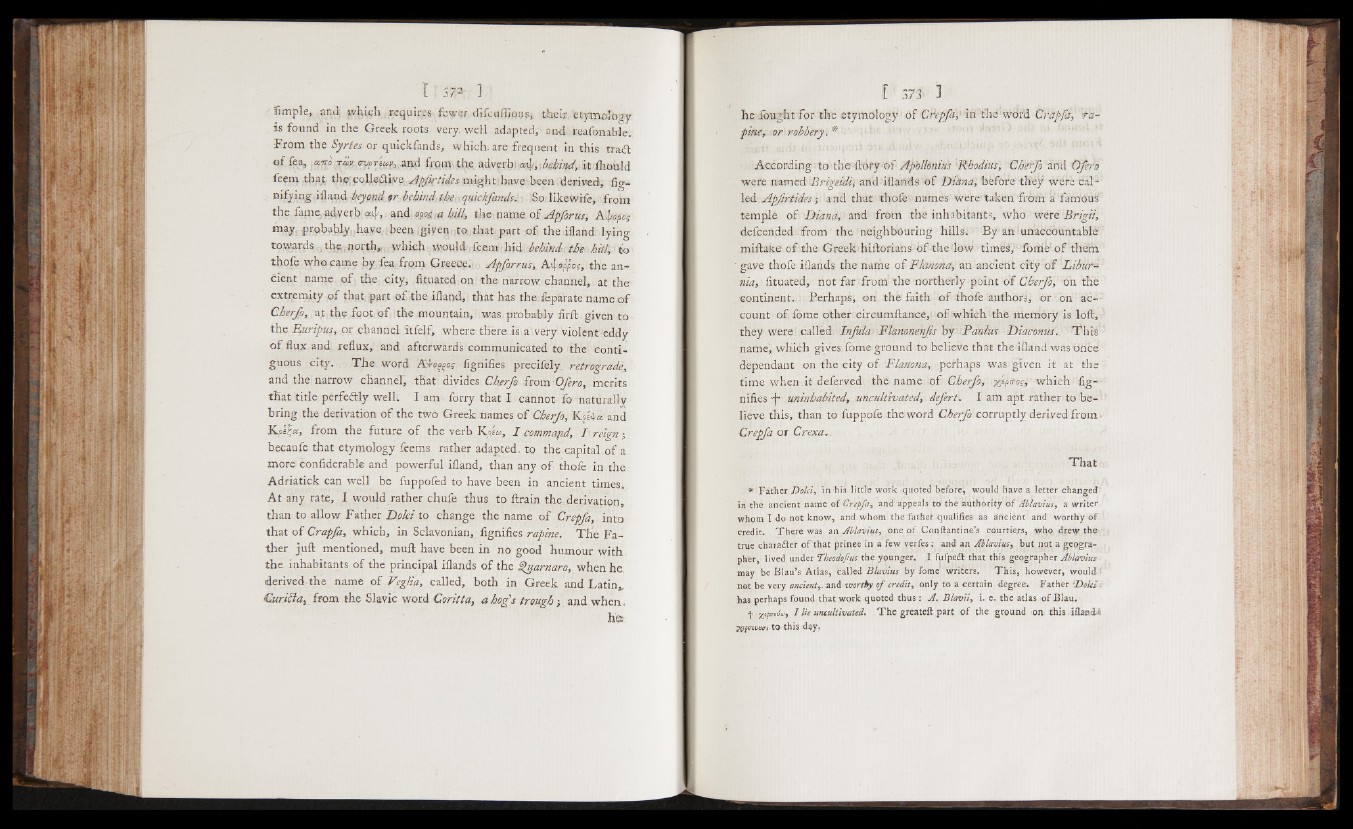
Stnple, and', which requires fewar diftuffioos, their etymology
is found in the Greek roots, very, well adapted, and- reafonable.
From the Syr Us or quickfands, which-are frequent in this trail
of fea, .«ft« frqiji tl^e ^diVgrb^tJbi^/W.itfhould
feem that the colJeitive Apfn'lides might have been derived, fio-_
nifying illapd beyond tr behind {¡be,, quickfands. |. iS.o likewife, from
the iafiie adverb col, and,flo »S^ kUi the: name of Ay for us, A ¡¡§ 1
may. probacy,.hayeabeensgiyen to that part o f the ifland lying
towards (tbe-.tiorth„, which,,\yiould',feem -hid behitid-the h i/ i,io
thole who came by. fea from Greece.- Apfarrus, A-i sdbf, the ancient
name o f the city; fituated on the narrow channel, at the-
extremity o f that part o f the ifland, that has the.feparate name o f
Cherfo, at the foot o f the mountain, was probably firft given to
the Euripus, or channel itfelf, where there is a very violent eddy
o f flux and reflux, and afterwards communicated to the contiguous
city. The word A ko^oc lignifies precifely. retrograde»
and the narrow channel; that divides Cherfo iiomOfero, merits
that title perfectly well. I am forry that I cannot fo-naturally
bring the derivation of the two Greek names o f Cherfo, KdWznd
K f r o m the future of the verb Koia, I command, I reign;
becaufe that etymology feems rather adapted, to the.capital o f a
more confiderable and powerful ifland, than any of- thofe in the
Adriatick can well be fuppofed to have been in ancient times.
A t any rate, I would rather chufe thus to ltrain the derivation,
than to allow Father Dolci to change the name o f Crepfa, into
that o f Crapfa, which, in Sclavonian, fignifies rapine. The Father
juft mentioned, mull have been in no good humour with
the inhabitants of the principal iflands o f the Spuarnaro, when he.
derived the name o f Veglia, called, both in Greek and Latin,.
Curibla., from the Slavic word Coritta, a hogs trough; and when,
h e
he fought for the etymology of Crepfa',' in the word Crapfa, ' t'a-
pine, or robbery. *
According to tho'&Ofj oi Apblionitts 'Rbodius; Cherfo fin'd Ofero
were named IBrigei'dii arid iflaitds o f Dfana', before they were fcal-*
Ic&.ApJhetitks j: 'and that thofe| natnis- were1 taken from a famous'
temple of Diana, and from the inhabitants, who were Brigii,
defcended from the neighbouring hills. By an unaccountable
miftake o f the Greek hiilorians o f the low times; fome o f them
" gave thofe, iflands the name o f Flcmondj an.ancient city o f Libur-
nia, fituated, not far from' the northerly point o f Cherfo, on the
continent. Perhaps, on the faith o f thofe authors, or. on account
of fome other circumftance, o f which the memory is loft,
they were called Infula Flanonenfshy Paulus Diaconus. This
name', which gives fome ground to believe that the ifland wastince
dependant on the city o f Flanona, perhaps was given it at the
time when it deferved the name o f Cherfo, which fignifies
■{-■ uninhabited, uncultivated, defert. I am apt rather to believe
this, than to fuppofe the word Cherfo corruptly derived from -
Crepfa or Crexa-
T h a t
* Father Dolci, in his littfe work quoted before, would have a letter changed
in the ancient name of Crepfa, and appeals to the authority of Ablavius^ a writer
whom I do not know, and whom the father qualifies as aihcient and worthy of
credit.. There was an Ablavius, one of. Conftantine-’s courtiers, who drety the-
true chara£ter o f that prince in a few verfes; and an Ablavius^ but not a geographer,
lived under Theodofus the younger. I fufpe& that this geographer Ablavius-
may be Blau’s Atlas, called Blavius by fome writers. Th is, however, would *
not be very ancient y. and worthy of credit, only to a certain degree. Father ‘Dolci;
has perhaps found that work quoted thus: A. Blavii, i. e. the atlas of Blau.
f XtftritSo, 1 lie uncultivated. T h e greateft part o f the ground on. thi&.iflandi
to this day.«